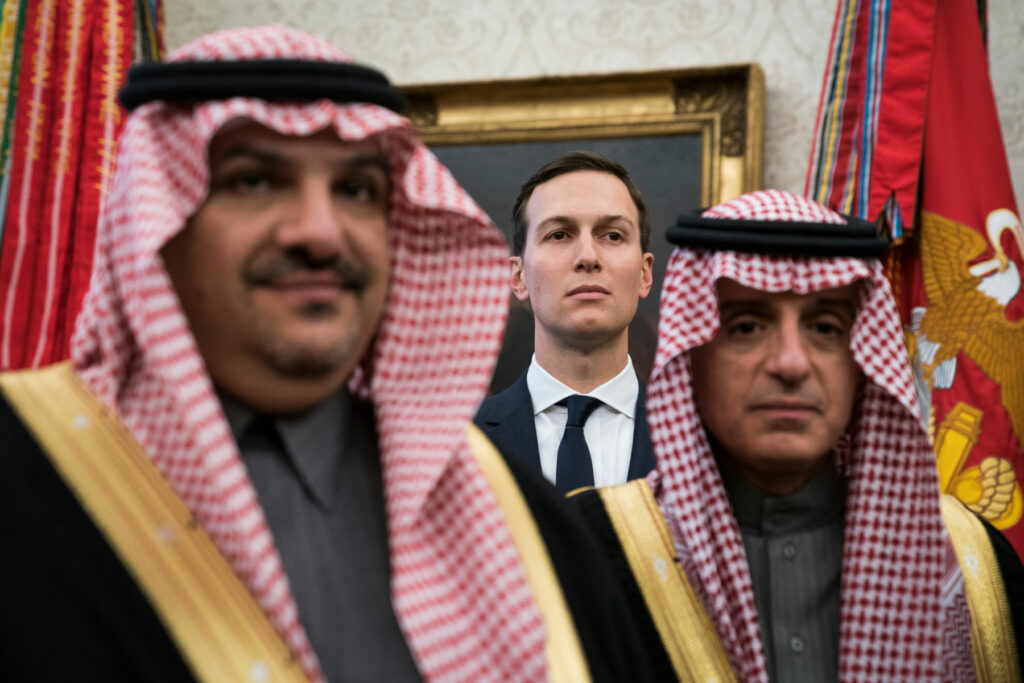Sarah Leah Whitson is the Executive Director of DAWN.
Editor's note: This article is adapted from a paper presented at the workshop Bridging Restraint and Positive Engagement: Toward a New Framework for U.S. Middle East Policy that was co-hosted by DAWN and Yale Law School.
As difficult as articulating a comprehensive vision for positive U.S. engagement in the world is imagining the operating environment that would actually make it possible, free from the current political and economic impediments in Washington.
Foreign policy is perhaps the least democratic of all U.S. government policies, remote from the interests and concerns of the general electorate, and historically treated as the sole prerogative of the executive branch. The American public generally entrusts political and military officials to best protect America's national interests around the globe, deferring decision-making to them. Power in foreign policy is also far more concentrated in the hands of the executive branch, despite constitutional and legislative checks on that authority, like the War Powers Act, which have often been curbed or avoided by the White House. In the absence of interest from or accountability to the American electorate, U.S. policy-makers have much wider margins to make decisions, and special interest groups much more latitude to influence them. These special interest groups include not just the well-documented "military-industrial complex" but increasingly foreign governments themselves, which directly and indirectly influence U.S. government decision-making in Washington.
Without addressing these structural impediments, advocacy designed to shape U.S. foreign policy based on evidence of a government's gross human rights abuses or even the dangers to American national security stands little chance of competing against the siren calls of dollars from lobbyists and foreign governments. A U.S. foreign policy rooted in restraint that still fulfills America's international legal obligations and human rights commitments will not be possible without first reforming the laws that effectively make this an unequal fight of free ideas versus financial interests. To win the hearts and minds of America's elected officials, the incentives that reward them for making bad decisions must be neutralized. That's why advocacy groups, academics, think tanks and journalists should consider devoting a significant portion of their time to leveling the playing field that has ensured that good policy recommendations, no matter how meritorious, always end up in the dust bin when it comes to U.S. foreign policy.
New machinery for influence in Washington has emerged from foreign governments lobbying for a perpetual American war footing.
- Sarah Leah Whitson
The Defense Industry
The defense industry's lobbying machinery has well-deserved notoriety in its ability to secure the benefits of the U.S. government's largest area of spending to procure for itself, its beneficiaries and its clients billions in weapons and the associated training, consulting, maintenance and operations personnel they require. The U.S. defense budget in 2023 reached $816.7 billion, including $162 billion in direct procurement. In 2021, the Defense Department awarded 61 percent—a whopping $422.2 billion—of the total $692.2 billion in federal government contracts, with almost 40 percent going exclusively to 10 defense contractors, including Lockheed, Raytheon, Boeing, General Dynamics, BAE, Northrop Grumman and Huntington Ingalls Industries. The Pentagon is now also turning directly to the capital markets to further expand investments in defense companies through its "Office of Strategic Capital," offering guarantees for loans and investments for private sector "partners," effectively expanding funding to, and further buttressing, the military-industrial complex.
In addition, the U.S. government's military aid program dramatically increased with the war in Ukraine, reaching $43 billion to Ukraine (as of August 2023), in addition to annual outlays of $3.8 billion to Israel, $1.45 billion to Jordan, $1.3 billion to Egypt, among the leading recipients. In reality, these sums overwhelmingly represent direct cash transfers from the U.S. government to U.S. defense companies to produce and deliver the equipment to the designated countries. Foreign military sales, averaging $45 billion annually, make up another major area of defense industry profits and require extensive lobbying because such sales typically require U.S. government approval. While India, with a population of 1.42 billion people, is now the top weapons purchaser of the world at 11 percent of global arms sales, Saudi Arabia, with a population of 36 million, is second at 9 percent, the vast majority purchased from the U.S. Qatar, with a population of just 2.6 million people, is third at 6.4 percent, making these two Gulf countries by far the greatest per capita weapons purchasers in the world.
Defense industry influence traditionally has relied on a combination of direct lobbying of government officials; campaign donations to elected officials, which exceeded $50 million in 2020; and industry jobs for government and military officials, creating an incestuous and intertwined system rife with conflicts of interest. For civilian officials, many of these jobs are themselves as lobbyists for the defense industry. For military officials, these are typically jobs within the industry, or as consultants increasingly embedded within the Pentagon and branches of the military, involved in negotiating and implementing the procurement contracts for which they previously represented the U.S. government. "As of 2021, there have been 672 instances in which former government officials, military officers, members of Congress and senior legislative staff were found to be working for the top 20 defense contractors," a report from U.S. Senator Elizabeth Warren, Chair of the Senate Armed Services Subcommittee on Personnel, noted earlier this year. "In 91 percent of these cases, the individuals who went through the revolving door became registered lobbyists for big defense contractors."
Defense industry profits are commensurate with the maintenance of the giant, dominant American military footprint around the world and expanded conflicts and wars. With Russia's invasion of Ukraine, 2022 in particular was a "banner year" for the top five U.S. weapons firms, "which outperformed major Wall Street indexes, mostly on the backs of American taxpayers." While defense company officials are careful never to publicly advocate for war and conflict, they sometimes slip, as Raytheon CEO Greg Hayes did when he told shareholders in February 2022, as war loomed in Ukraine and following Houthi drone attacks on the United Arab Emirates, among other global instability:
[W]e are seeing, I would say, opportunities for international sales. We just have to look to last week where we saw the drone attack in the UAE, which have attacked some of their other facilities. And of course, the tensions in Eastern Europe, the tensions in the South China Sea, all of those things are putting pressure on some of the defense spending over there. So I fully expect we're going to see some benefit from it.
While the defense industry doesn't directly lobby for war, it does lobby hard for greater expansion of U.S. military spending in the name of national security. In 2022, the National Defense Industrial Association, a major lobbying group for defense contractors, warned lawmakers that failing to pass a spending bill "risks signaling a lack of seriousness and competence to counter Russian aggression in the Ukraine and Chinese actions in East Asia and the South China Sea."

Foreign Government Influence
In recent years, new machinery for influence in Washington has emerged from foreign governments lobbying for a perpetual American war footing. Unlike defense industry lobbying, foreign governments are much more direct in advocating for specific foreign policy outcomes, typically focused on maintaining U.S. support for their perceived political and security interests. The national security implications of such foreign influence in America's political and economic systems are profound. Various American special interest groups—not just defense, but pharmaceuticals, guns, tobacco, and more—have corrupted Washington for years, spending their way to influence. What's new and different now is that foreign governments are using the freedom of the U.S. political system that allows just about any foreign government or person to hire a lobbyist to advocate for its interests with elected American officials and to direct contributions to their campaigns. U.S. laws and regulations are outdated and ineffective against foreign influence, having been drafted at a time when the extent of such influence in the U.S. political system was unimaginable.
Foreign government lobbying in particular has vastly expanded over the past decade, with estimated spending at $4.1 billion since 2016, with the hiring of more than 1,040 foreign principals and 2,913 new lobbyists since 2016. Four countries in the Middle East are among the top ten spenders on lobbying by foreign governments, including, in order of spending, Qatar, the UAE, Saudi Arabia and Israel. Saudi government lobbying expanded to a peak of $32 million in 2018, when public criticism of its murder of journalist Jamal Khashoggi and the Saudi-led war in Yemen were at an all-time high. U.S. aid recipients like Egypt and Jordan have also relied on lobbyists in Washington, though with less urgency as America's military aid commitment to them has been secured broadly through their peace deals with Israel. For its part, Israel relies on the unmatched power and spending of domestic lobbies like the American Israel Public Affairs Committee (AIPAC) to promote its interests, especially with major campaign contributions by its affiliates, which spent roughly $13.5 million on campaign contributions in 2022 alone.
Increasingly, wealthy Gulf states are using their resources to exert soft power in centers of American political and social influence, such as think tanks, universities and hospitals. For example, the president of the upcoming COP-28 climate summit in the UAE, Sultan al-Jaber—who is also CEO of the Abu Dhabi National Oil Company—recently hired prominent American lobbyist Zev Furst to "inoculate" him and the Emirati government from criticism about a fossil fuel executive chairing talks on climate change. Furst's tasks include promoting Jaber and the UAE's image with think tanks including the Council on Foreign Relations, the Carnegie Endowment for International Peace, the Center for Strategic and International Studies, the Brookings Institutions and the Heritage Foundation, so that they could "serve as independent, third-party endorsers and supporters of the UAE, Dr. Al Jaber and COP28," according to Politico. Furst seems to have succeeded at least with CFR, which hosted Jaber to present remarks to its members at their headquarters in September 2023.
But the sums spent on such "soft power" exercises are only a tiny fraction of foreign government's economic investments, particularly by oil-rich Gulf states that have reaped enormous, unprecedented profits from sky-rocketing global energy prices. Most prominent in spending among them has been the Saudi government's sovereign wealth fund, the Public Investment Fund (PIF). Chaired by Crown Prince Muhammad bin Salman (MBS), it has over the past three years directly invested over $7 billion in American economic, social and cultural institutions, for full or significant ownership control of print and social media companies, sporting institutions like golf, mixed martial arts, and tennis; gaming; banking; finance; technology; film and entertainment; agriculture; and petroleum.
While Gulf states have long sought to diversify their economies with investments abroad, at least one goal now appears to be creating a domestic constituency of their own across these sectors of the American economy, tethering corporate and institutional interests to the interests of the Saudi monarchy. Some of these investments, like the PIF's 97 percent ownership stake in the newly created golf league, LIV Golf, have produced no financial gain and seem to be motivated not by profits but by influence. Saudi Arabia has naturally sought to prevent any renewed fallout in the face of new human rights abuses, as it experienced after MBS ordered the murder of Jamal Khashoggi, which led many businesses to cut off their investments in and from the Saudi government.
Many have characterized these Saudi investments as attempts to "sportswash" (with $6 billion spent globally on sports deals since 2021) or even "artswash" the tarnished image of the Saudi government. Yet there's little evidence to suggest that Saudi Arabia's image has genuinely improved, particularly in the face of persistent, relentless evidence of new abuses and atrocities. All this spending is really an effort to exert influence and control of these institutions themselves, in order to ensure they can be reined in from criticizing the Saudi government in the future and counted on to support its interests with the U.S. government. The proposed $3 billion PGA Tour acquisition by Saudi-owned LIV Golf goes so far as to include a specific non-disparagement clause that will bar PGA's staff and members, including the golfing athletes, from "disparaging" Saudi Arabia or its officials.
While some elected officials in Washington have expressed dismay at the national security implications of expanded foreign investments in the U.S. economy, their primary focus and ire have been directed at investments by China, Russia or other countries perceived to be at odds with the U.S. government and national interests. In July and September 2023, a Senate panel held the first and second of what are promised to be several hearings into the Saudi/LIV Golf effort to acquire PGA Tours and concerns about the dangers of foreign influence and control by a notoriously abusive regime over a cherished American institution.
Interestingly, Sen. Richard Blumenthal, who chairs this Senate committee, had asked the head of the PIF, Yassir Al-Rumayyan, to appear voluntarily at the hearing. When he declined, the committee issued a subpoena to compel his testimony, the fallout from which is unclear as of this writing. In the prior litigation between LIV Golf/PIFs and the PGA Tour, Rumayyan had claimed sovereign immunity when he refused to testify at a hearing, but was overruled by a federal judge. The Saudi offer to acquire the PGA Tour and end the litigation against the PIF could well have been motivated by a desire to avoid having Rumayyan testify in a U.S. court and be forced to disclose damaging information about the Saudi government's investment strategy. Most importantly, the refusal of a foreign government official to testify about its acquisition of a U.S. organization on grounds of sovereign immunity is indicative of the absence of regulation and control over politically motivated commercial activity.
Yet neither spending on lobbyists nor on American businesses or institutions can match the influence that foreign governments, led by Saudi Arabia and the UAE, expect to gain from directly paying former U.S. government and military officials themselves. Saudi Arabia's sovereign wealth fund has made eye-popping payouts to former Trump administration officials, including $2 billion to Jared Kushner's brand-new private equity firm and $1 billion to former Treasury Secretary Steven Mnuchin's own firm. The PIF has also made multimillion dollar payments, via LIV Golf, to golf resorts owned by former President Donald Trump. In addition, since 2015, at least 500 retired U.S. military personnel have taken lucrative jobs working for Saudi Arabia, the UAE and other foreign governments, as The Washington Post reported. Since 2016, 15 retired U.S. generals and admirals have worked as highly paid "consultants" for the Saudi Defense Ministry—with U.S. government approval.
The conflicts of interest these new revolving doors to Gulf royals create for policy-making in the U.S. government should be obvious. Civilian and military officials can now anticipate cashing-in on their time in office once they leave government, with the promise of vast sums from Gulf countries that are also trying to steer U.S. policy in the Middle East. Some elected officials in Washington, like Republican Sen. Tom Cotton, have defended this revolving door, insisting that the U.S. itself gains influence by having its former officials employed by foreign governments this way, ensuring continued security and military dependence on the United States. While this may well create a certain dependence on U.S. defense contractors, there is no evidence to suggest that these former employees of the U.S. government are now exerting meaningful leverage with their new foreign employers on America's behalf.
Instead, wealthy foreign governments in the Gulf appear to have found the true Achilles heel in the U.S. democratic system: the complete absence of meaningful laws prohibiting American officials from working or doing business with a foreign government after leaving the U.S. government. Buying influence with current U.S. officials based on the promise of future employment, business or investment is not just a problem of actual conflict of interest for any particular foreign policy decision, though there is ample evidence of that in much of the Trump administration's shockingly pro-Saudi policies. It is also a grave national security risk writ large when American officials can be incentivized to make decisions not in the interests of the American people, not even in the interests of American industries, but in the interests of their future foreign paymasters. The promise of foreign payouts seriously erodes the integrity of America's own democratic system. It is hard to trust any American official to decide, for example, whether the U.S. should extend security guarantees to Saudi Arabia or the UAE when they may well be receiving their first paycheck from these same foreign governments when they leave office. Most corrosive of all is the appearance of such conflicts of interest, eating away at what trust Americans have left in their elected officials and government.
The promise of foreign payouts seriously erodes the integrity of America's own democratic system.
- Sarah Leah Whitson
Gaps in Regulation
The principal challenge to addressing this encroaching influence and control over the U.S. government and America's open economic system is the absence of meaningful regulation. Neither the lobbying rules nor the "revolving door" ethics rules limit the ability of a foreign government to use its resources to lobby and influence U.S. elected officials.
The two primary bodies of laws governing lobbying are the Lobbying Disclosure Act and the Foreign Agents Registration Act. As their names imply, these laws regulate lobbyists for foreign governments primarily by requiring them to register with the federal agencies responsible for overseeing their conduct and to disclose their activities. There is no law that prohibits a foreign government, no matter its human rights record or reputation for corruption, from hiring American lobbyists to woo American officials to cater to its interests. There is no law that prohibits American officials from meeting with lobbyists for corrupt or abusive governments, either. The disclosure rules assume that mere knowledge of the fact that a person is a lobbyist for a foreign government will sufficiently put the targeted official on guard to judge accordingly the information the lobbyist provides. But there are no bars on the lobbying firm or its employees from directly contributing to the elected officials with whom they meet, even if their contributions are in part received from a foreign government.
Similarly, there are no ethics rules that prohibit U.S. government officials from obtaining employment or doing business with a foreign government after they leave office. What little rules exist merely require disclosure, and in certain cases, advance approval for a limited period of time post-employment. The "Standards of Ethical Conduct for the Employees of the Federal Branch," 5 C.F.R. 2635, regarding communications and negotiations of U.S. government officials for future employment or business, requires only disclosure and recusal of an official negotiating future employment while still working for the U.S. government. The only prohibitions on future employment for civilian and military officials pertain to narrow and limited bans on appearances and communications before the U.S. government, on behalf of the new employer. Beyond these limited barriers, any U.S. military or government official can obtain employment or do business with any foreign government they want—such as a $2 billion investment in their fledging firm, or a consultancy gig with a government agency seeking to purchase new weapons from an American company.
This stands in contrast to new legislation that restricts intelligence officials from working for foreign governments when they leave office. On March 15, 2022, President Biden signed the 2022 Intelligence Authorization Act with provisions prohibiting U.S. intelligence agents with knowledge of national security interests and spycraft from the Central Intelligence Agency, the National Security Agency and the more than dozen other U.S. intelligence agencies from selling their services to foreign governments for at least 30 months following the end of their federal employment. It also requires them to report any foreign government work to the U.S. intelligence community and Congress for five years after they leave service.
Congress passed the legislation in light of a crisis exposed by former U.S. intelligence agents working for foreign governments, specifically former National Security Agency officials who worked for the Emirati government. They had shared surveillance technology and techniques with the UAE, helping the Emirati government hack hundreds of phones and spy on journalists, dissidents and U.S. citizens in a venture called "Project Raven." The Department of Justice also successfully prosecuted the former intelligence officials for their roles in this hacking.
There are now a number of legislative initiatives pending that are designed to address at least some of these shortcomings, but there is no bill pending that will create an absolute prohibition on lobbying by or for foreign governments or doing business with or working for a foreign government after leaving office. Most significant among these bills is Sen. Warren's Anti-Corruption and Public Integrity Act, the provisions of which are detailed in the recommendations below.
Recommendations
What follows are DAWN's policy recommendations for reforming these structural impediments to sound, beneficial foreign policy decision-making. Most of the recommendations urge Congress to issue new laws to limit foreign influence in the U.S. government, while others urge both members of Congress and senior military and executive officials to make individual pledges designed to avoid foreign influence until such legislative reforms are secured.
Others are addressed to lobbying firms themselves, pursuant to their obligations under the U.N. Guiding Principles on Business and Human Rights and the Organization for Economic Co-operation and Development (OECD) on Principles for Transparency and Integrity in Lobbying (the OECD Principles). Advocacy groups, academics and think tanks concerned with U.S. foreign policy should work collectively to secure these policy changes and legislation to even the playing field and reduce financial incentives that cloud sensible decision-making by public officials.
To the U.S. Congress:
1. Introduce legislation banning government and military officials from working with or for foreign governments for at least 30 months following the end of their employment. Such a law could closely mirror the 2022 Intelligence Authorization Act, which prohibits U.S. intelligence agents with knowledge of national security interests and spycraft from American intelligence agencies from selling their services to foreign governments for at least 30 months following the end of their federal employment, as well as requiring them to report any foreign government work to the U.S. intelligence community and Congress for five years after they leave service. It should prohibit senior government and military officials from working from, advising, or soliciting foreign government officials or entities.
2. Reintroduce and Pass the Anti-Corruption and Public Integrity Act. This legislation, introduced by Sen. Warren, is by far the most robust in its attempts to curb corporate and foreign government lobbying, and addresses some aspects of the revolving door, but stops short of a time-bound ban on officials working with foreign governments after they leave office. However, it does propose a ban on working for "the world's largest companies" for four years after an official leaves office, which at least could capture the sovereign wealth funds of Saudi Arabia and the U.A.E.
Among this bill's many provisions are one that would require senior government officials and White House staff to divest from privately-owned assets that could present conflicts, including large companies and commercial real estate; apply ethics rules to all government employees, including unpaid White House staff and advisors; and require most executive branch employees to recuse from all issues that might financially benefit themselves or a previous employer or client from the preceding 4 years.
It would also introduce a lifetime ban on lobbying by Presidents, Vice Presidents, Members of Congress, federal judges, and Cabinet Secretaries; multi-year bans on all other federal employees from lobbying their former office, department, House of Congress, or agency after they leave government service until the end of the Administration, but at least for 2 years (and at least 6 years for corporate lobbyists); require income disclosures from former senior officials 4 years after federal employment; prohibit companies from immediately hiring or paying any senior government official from an agency, department, or Congressional office recently lobbied by that company; prohibit the world's largest companies, banks, and monopolies (measured by annual revenue or market capitalization) from hiring or paying any former senior government official for 4 years after they leave government service. It also includes some limits on government employment by former lobbyists, including prohibiting current lobbyists from taking government jobs for 2 years after lobbying; 6 years for corporate lobbyists.
The bill would also tighten some of the gaps in existing lobbying law by expanding the federal definition of a "lobbyist" to include all individuals paid to influence government; create a new "corporate lobbyist" definition to identify lobbyists of for-profit entities and their front-groups; expand disclosure of specific bills, policies, and actions lobbyists are attempting to influence; any meetings with public officials; and any documents they provide to those officials.
With respect to foreign governments, the bill also seeks to ban American lobbyists from accepting money from foreign governments, foreign individuals, and foreign companies to influence United States public policy. It would also ban direct political donations from lobbyists to candidates or Members of Congress and end lobbyist gifts to the executive and legislative branch officials they lobby.
3. Reintroduce and Pass the Fighting Foreign Influence Act. Title II of the Act, the Congressional and Executive Foreign Lobbying Ban Act, would impose a lifetime ban on former senior U.S. military officers, presidents, vice presidents, other senior executive branch officials, and members of Congress from ever lobbying for a foreign principal.
To U.S. military and civilian officials and their staff members:
Pending legislation, members of Congress, as well as senior military and government officials, should make the following commitments:
1. No Business with Foreign Governments After Leaving Office: Public officials should pledge not to do business with or seek payment or employment from foreign governments or their agencies for at least three years after leaving office.
2. No Meetings with Abusive Government Lobbyists: Public officials should pledge to refrain from meeting with lobbyists working on behalf of a government, its agencies, or officials where there is credible information, documented by human rights organizations or by the State Department's Annual Human Rights Report, implicating the government in gross violations of human rights or international humanitarian law.
3. No Lobbying for Abusive Governments: After leaving office, public officials should pledge to refrain from lobbying on behalf of foreign governments, agencies, or officials where there is credible information implicating them in GVHRs or serious violations of international humanitarian law.
To the Lobbyists:
1. Client Due Diligence: Lobbyists should conduct a due diligence review examining the human rights and humanitarian law record of a government, government agency, or government official they seek to represent and determine the extent to which their representation would contribute to, or benefit from, any of their human rights or humanitarian law abuses, including by misrepresenting or omitting information to the public or U.S. government officials and representatives about their human rights and humanitarian law record. It should also make such reviews public.
2. Refuse to Work for Abusive Governments, Agencies, or Officials: Lobbyists should pledge to decline representation of a foreign government, government agency, or government official where there is credible information implicating them in the commission of gross violations of human rights or international humanitarian law.
3. Adopt and Pledge to Comply with the OECD Recommendations and the U.N. Guiding Principles: U.S. lobbyists should adopt the OECD Recommendations, including those aiming to enhance transparency, honesty, and accuracy in the information provided by lobbyists to government officials. U.S. lobbyists should also adopt the U.N. Guiding Principles on Business and Human Rights.
4. Assess Human Rights Impact of Lobbying Activities: Lobbyists should regularly assess their existing lobbying activities for foreign governments, agencies, or officials to evaluate whether they contribute to or benefit from adverse human rights impacts, pursuant to the U.N. Guiding Principles. Where such contribution or benefit exists, lobbyists should take appropriate measures to address them, including, when necessary, by terminating an existing lobbying contract. These responsibilities include a responsibility to prevent or mitigate adverse human rights impacts that are directly linked to lobbying activities, even if the lobbyist has not contributed to those impacts.





































